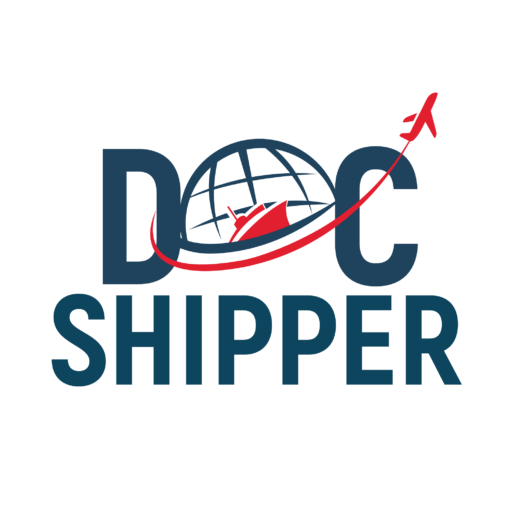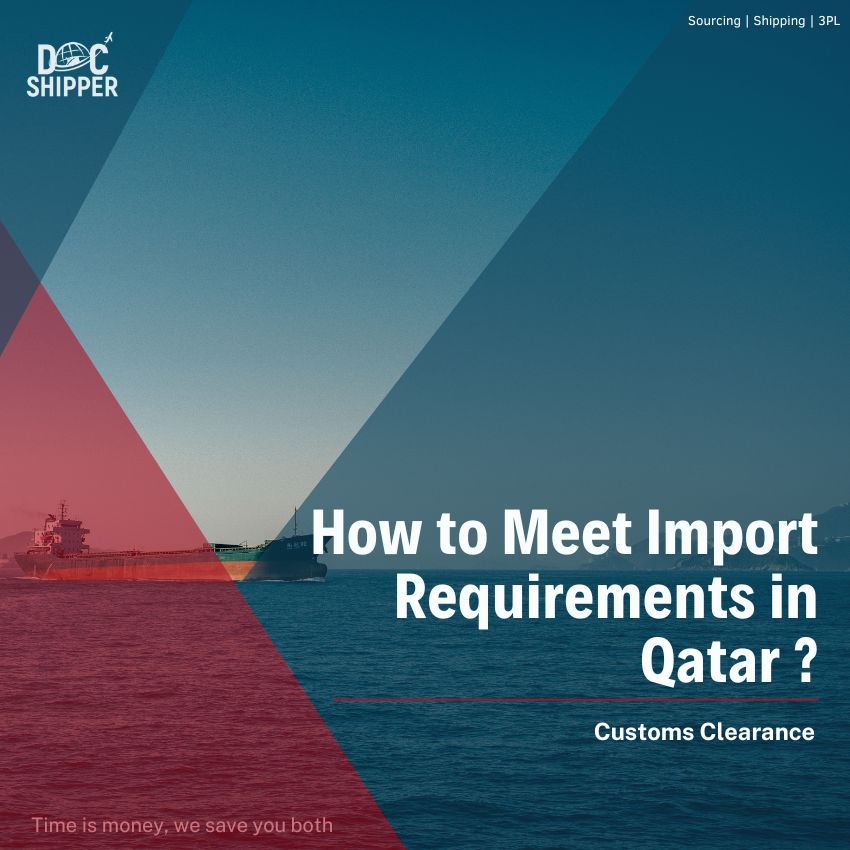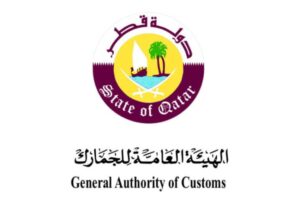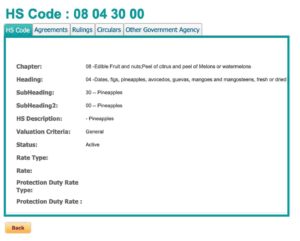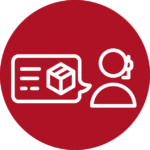The guide "Getting Your Goods into Qatar: How to Meet Import Requirements" furnishes details on the required regulations and procedures for importing goods into Qatar, comprising documentation, customs clearance, product testing, and items with restrictions. It's an advantageous tool for anyone wanting to import goods to Qatar while conforming to legal mandates and maximizing efficiency.
DocShipper note: Tired of the issues you’re constantly facing because of customs checkpoints? All that paperwork seems hard to prepare and to understand? Don’t worry about it! We got this. Thanks to our customs clearance service, we can handle all of these procedures for you. What are you waiting for, contact us!
Table of Contents
Comprehending the regulations for importing goods to Qatar
To import goods to Qatar, it's essential to obtain the necessary permits, follow customs regulations, meet safety and quality standards, comply with restrictions on certain items, and use an authorized agent for customs clearance and delivery. You must also ensure that the products comply with labelling requirements and stay informed of any regulatory changes. Seeking guidance from relevant authorities or experts can help ensure compliance with all requirements.
1. What are the regulations for bringing goods into Qatar?
The regulations for bringing goods into Qatar include the following:
- Obtaining the necessary permits and licences: acquiring permits and licences, such as import licences, customs clearance permits, and certificates of origin, is mandatory for importing goods into Qatar. The specific requirements vary according to the type of goods and regulations. Seeking guidance from authorities or experts is crucial to ensure adherence to all the prerequisites.
- Complying with customs regulations and submitting the required documents: adhering to customs regulations is critical for importing goods into Qatar. Importers must submit necessary documents and undergo a customs clearance process to ensure adherence to safety and quality standards.
- Meeting safety and quality standards set by the relevant authorities:
Before importing goods into Qatar, it's necessary to comply with the safety and quality standards established by the authorities, which cover product safety, health, environment, and technical requirements.
- Adhering to restrictions on certain items, including weapons, narcotics, and alcohol: Adhering to restrictions on certain items, including weapons, narcotics, and alcohol, is crucial for importers bringing goods into Qatar, as non-compliance can lead to legal consequences. Importers must also comply with any other specific restrictions or bans on goods related to intellectual property, cultural heritage, and endangered species.
- Using an authorized agent for customs clearance and delivery:
To ensure compliance with regular
ions and streamline the import process, it is important to use an authorized agent for customs clearance and delivery when importing goods to Qatar.
Such agents can handle documentation, and delivery, and ensure adherence to regulations.
Engaging an authorized and reputable agent is essential to avoid potential delays and complications.
- Ensuring that the products comply with labelling requirements:
Imported goods in Qatar must comply with labelling requirements set by authorities.
Staying informed about any regulatory changes and seeking guidance from relevant authorities or experts is crucial to ensure compliance with all requirements when importing goods into Qatar.
2. Why is it necessary to obtain import licences and permits for goods that require special permits?
There are multiple reasons why it's crucial to obtain import licences and permits for goods that necessitate special permits.
- Firstly, some goods like hazardous materials, wildlife products, and drugs require special permits due to their intrinsic nature. Importing such goods without mandatory permits is illegal, and it could result in penalties, fines, or criminal charges.
- Secondly, some goods such as certain chemicals or medical devices pose a risk to public safety or health and require special permits. By getting the required permits, these goods are handled and used safely, which reduces the risk of harm to the public.
- Lastly, specific goods like pesticides or pollutants have the potential to harm the environment and require special permits. By obtaining the necessary permits, these goods are imported and used in a way that decreases harm to the environment. Ultimately, obtaining import licences and permits for goods that require special permits is essential to ensure conformity with regulations, safeguard public safety, and reduce harm to the environment.
Classification of Goods and Customs Fees
Goods are categorized for customs purposes through classification based on their:
- Nature
- composition
- intended use.
Governments apply customs fees, including import duties, taxes, and other charges, on imported or exported goods. The classification of goods is important because it determines the customs fees that apply, which can impact the cost of international trade.
1. What is the system for sorting goods for importation into Qatar
- Importing goods into Qatar is subject to the country's customs regulations and procedures, which are overseen by the Qatar Customs Authority (QCA).
- Importers must obtain the appropriate permits and licences, such as a commercial registration certificate and import licence, and comply with any relevant regulations and standards for the specific product being imported. They must also declare the quantity and value of the goods and pay any applicable duties, taxes, and fees.
- The QCA may inspect the goods to ensure they meet all applicable standards.
- Qatar Customs has required official invoices, a certificate of origin, and packing lists since April 1, 2011.
- The HS code must be present, and the country of origin must match across all documents.
- Discrepancies will cause the shipment to be returned.
- The COO should mention the country of origin for European goods, even from multiple countries.
Once the goods pass through customs, they can be transported to their destination in Qatar. The QCA offers customs clearance, warehousing, and transportation services to aid in the importation process.
If you require any help or information regarding our shipping services, feel free to contact us here, and our team will respond to you within 24 hours.
1. Overview of the customs duty rates and taxes imposed on different types of products
- The customs duty rates and taxes for products imported into Qatar vary based on their nature and value. Most goods are subject to a 5% duty rate, while some luxury items, tobacco, and alcohol have higher rates. In addition to customs duty, there is also a 10% value-added tax (VAT) based on the CIF value of the goods.
- Excise taxes on certain products like tobacco and energy drinks may also apply. Importers must provide official documentation, including invoices, certificates of origin, and packing lists, to avoid delays or rejection of their shipments.
- Proper research and understanding of customs regulations and duty rates are essential for compliance and cost calculations.
2. Overview of the customs clearance procedures and documents essential for importing
- Providing necessary documents: Importers must provide official invoices, certificates of origin, and packing lists for their shipments. The documents must contain accurate information, including the HS Code, country of origin, and value of the goods.
- Customs declaration: Importers must submit a customs declaration, declaring the value and quantity of the goods being imported, as well as any applicable duties, taxes, and fees that must be paid.
- Obtaining necessary permits and licences: Importers must obtain a commercial registration certificate and an import licence, as well as comply with any applicable regulations and standards for the specific product they are importing.
- Customs inspection: The Qatar Customs Authority (QCA) may inspect and examine the goods to ensure that they comply with all applicable regulations and standards.
- Clearance and transportation: Once the goods have been cleared by customs, they can be transported to their final destination in Qatar. The QCA provides various services and facilities to assist with the importation of goods, including customs clearance, warehousing, and transportation services.
What are the required documents for importation
The required documents for importation into Qatar:
- Commercial registration certificate
- Import licence
- Official invoices
- Packing lists
- Certificate of origin
- Bill of lading or airway bill
- Customs declaration form
- Insurance certificate
- Import permits or other specific permits or licences for certain products
It is essential to keep in mind that the requirements for importing may differ based on the nature of the product being imported. Therefore, it is advisable to conduct thorough research and comprehend the precise specifications for your particular merchandise.
Understanding why precise Labelling and Packaging are critical for importing Goods
When importing goods, precise labelling and packaging are crucial to meet the regulatory and safety standards of the importing country. Accurate labelling and packaging aid customs officials in identifying products, calculating duties and taxes, and preventing illegal activities.
Precise labelling provides consumers with vital information about the contents, ingredients, and usage of products, promoting informed decisions and safety.
Good packaging and labelling also enhance brand loyalty and a positive brand image.
Finally, accurate labelling and packaging can optimize the logistics of importing goods, reducing costs and improving delivery times.
DocShipper note: Need help clearing your goods in Qatar? Let our agents take care of everything so you don't get overcharged. Contact us to day for a free quote in 24h.
FAQ | How to clear customs in Qatar ?
When importing into Qatar, what steps should I take to accurately determine the customs value of my goods?
Accurately determining the customs value of your goods is crucial to avoid penalties or delays when importing into Qatar.
To do so, understand the customs value definition, gather necessary documentation, calculate transaction value and additional costs, account for discounts or rebates, and seek professional advice
How can a freight forwarder assist in the importation of goods?
A freight forwarder can assist in managing the logistics of an importation shipment from start to finish by preparing and submitting necessary documentation, managing customs clearance procedures, arranging the shipment of goods, providing warehousing and distribution services, and offering insurance coverage.
What are the potential risks and challenges when importing goods into Qatar, and how can I mitigate them?
Importing goods into Qatar can present challenges and risks that can impact your business. These include complying with customs regulations, logistics issues, currency exchange and payment problems, product compliance, and cultural barriers. Minimize these risks by understanding customs regulations, working with reliable shipping and logistics companies, using reputable payment service providers, and hiring a local agent or partner. Careful planning and preparation can increase your chances of success.
Are there any restrictions or regulations on importing specific types of goods into Qatar, such as food, electronics, or chemicals?
Importing goods into Qatar is subject to restrictions and regulations, and specific rules must be followed. This may include obtaining import permits, complying with technical standards for electronics, and registering chemicals with the Ministry of Municipality and Environment. Compliance is crucial to avoid penalties or delays, so research and understand the requirements for the goods you plan to import.
DocShipper info: Do you like our article today? For your business interest, you may like the following useful articles :
DocShipper Advise : We help you with the entire sourcing process, so don't hesitate to contact us if you have any questions!
- Having trouble finding the appropriate product? Enjoy our sourcing services, we directly find the right suppliers for you!
- You don't trust your supplier? Ask our experts to do quality control to guarantee the condition of your goods!
- Do you need help with the logistics? Our international freight department supports you with door to door services!
- You don't want to handle distribution? Our 3PL department will handle the storage, order fulfillment, and last-mile delivery!
DocShipper | Procurement - Quality control - Logistics
Alibaba, Dhgate, made-in-china... Many know of websites to get supplies in Asia, but how many have come across a scam ?! It is very risky to pay an Asian supplier halfway around the world based only on promises! DocShipper offers you complete procurement services integrating logistics needs: purchasing, quality control, customization, licensing, transport...
Communication is important, which is why we strive to discuss in the most suitable way for you!
